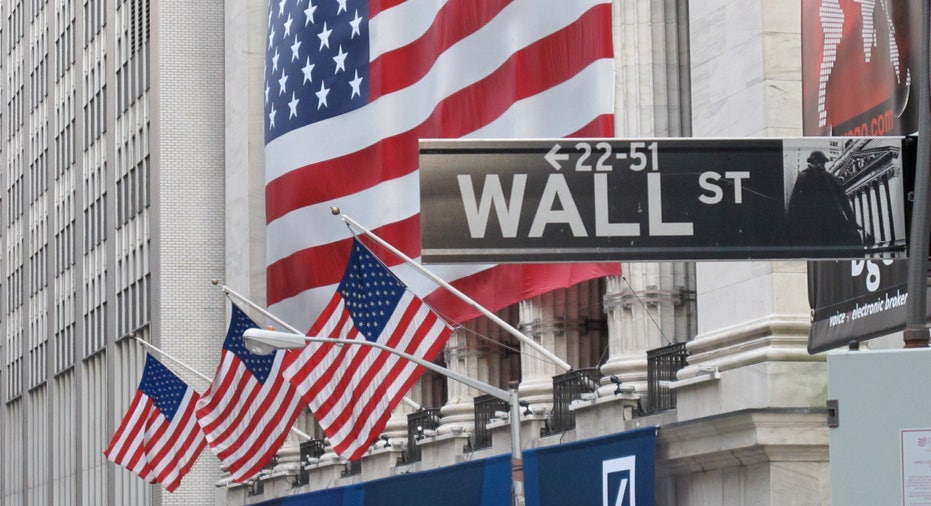Wall Street Selloff Fueled By Sinking Energy, Financials Stocks

U.S. stocks sold off sharply Tuesday, with the Dow industrials dropping 170 points, as weaker-than-expected manufacturing data in China renewed worries about global growth and sent investors scampering out of risky assets.
A surprise interest-rate cut in Australia added to global economic jitters.
The S&P 500 slumped 22 points, or 1.1%, to 2,059, with all 10 main sectors trading lower. Energy and materials led the losses, falling 2.7% and 2% respectively, following a drop in oil prices. Financials were also hit hard, down 1.8%.
"On risk-off days when investors are worried about global growth the assumption is that the Federal Reserve will refrain from raising rates. It is common to see financials sell off when investors think rates will stay lower for longer," said Maris Ogg, president at Tower Bridge Advisors. Lower rates hurt bank-lending margins.
"Energy shares went too far too fast since oil prices rallied off their lows in February, so any pullback in oil will hit oil companies hard," Ogg said.
Investors piled into Treasurys, sending the 10-year yields (http://www.marketwatch.com/story/treasury-yields-tumble-to-2-week-low-amid-global-market-jitters-2016-05-03) down 9 basis points to two-week low, while the CBOE Volatility Index jumped 10% to above 16, underscoring fear among traders.
The Dow Jones Industrial Average dropped 154 points, or 0.9%, to 17,735, with all but three of the benchmark's components, led by Pfizer Inc., trading lower.
Meanwhile, the Nasdaq Composite fell 49 points, or 1%, to 4,767, a day after scoring its first daily gain in eight sessions.
The losses on Wall Street erased gains from the previous session, when three benchmarks closed higher on Monday (http://www.marketwatch.com/story/wall-street-stocks-lined-up-for-moderate-gains-ahead-of-ism-data-2016-05-02), driven by data showing slow-but-steady economic growth in the U.S.
Augustin Eden, research analyst at Accendo Markets, said Tuesday's negative action came as investors digested the latest news from China and Australia. In China, a private gauge of nationwide factory activity in China fell to 49.4 in April (http://www.marketwatch.com/story/chinas-caixin-manufacturing-pmi-slips-again-2016-05-02), indicating a faster pace of contraction and missing analyst forecasts.
"And there's been an Australia interest-rate cut (http://www.marketwatch.com/story/dollar-slides-further-vs-yen-aussie-dollar-slumps-after-rate-cut-2016-05-03) that's potentially signaling a little bit of panic over on that side of the world and that has weakened the Aussie dollar quite a lot," Eden said.
"If you look at gold, it's trading around $1,300 an ounce, which if it breaks above that, that's a pretty good sign there'll be some safe-haven seeking. So there's a bit of fear in the markets this morning," he added.
The Australian dollar slumped to 74.97 U.S. cents (http://www.marketwatch.com/story/reserve-bank-of-australia-cuts-cash-rate-to-175-2016-05-03-0485414), down from 76.68 cents late Monday in New York.
The dollar, however, fell against most other major currencies as the yen extended its recent gains against the greenback. The dollar bought Yen106.29, compared with Yen106.54 late Monday, to trade around a level not seen since 2014.
The euro also surged against the buck (http://www.marketwatch.com/story/euro-leaps-above-116-for-first-time-since-august-dollar-dives-against-yen-2016-05-03), buying $1.1579, up from $1.1535 on Monday, on more bets that U.S. interest rates won't go up this year.
Data and Fed speakers: There was little on the economic data front on Tuesday, with only monthly auto sales among major releases.
U.S. light-vehicle sales regained momentum last months thanks to cheap credit, low gasoline prices and rising consumer confidence, with sales expected to hit a new monthly record high. However, car sales data didn't help car makers, as General Motors Co.(GM) and Ford Motors Co.(F) fell more than 1%.
Cleveland Fed President Loretta Mester said that waiting for markets to calm down before raising interest rates may backfire and just lead to more volatility. Mester is a voting member of the policy-setting committee this year.
Atlanta Fed President Dennis Lockhart, who is a non-voter, will give a speech on the economic outlook and monetary policy in Jacksonville, Fla., at 7 p.m. Eastern.
Movers and shakers: Energy companies were under pressure as crude oil prices erased earlier gains and traded below $45 a barrel again (http://www.marketwatch.com/story/crude-oil-slammed-13-as-supply-glut-fears-return-2016-05-03).
Among the top S&P 500 decliners were Chesapeake Energy Corp(CHK) and Southwestern Energy Company(SWN), down 9.8% and 7.4% respectively.
Pfizer Inc.(PFE) rose 3.2% after the drugmaker's first-quarter earnings beat forecasts (http://www.marketwatch.com/story/pfizers-stock-surges-after-results-beat-expectations-outlook-raised-2016-05-03).
Clorox Co.(CLX) jumped 4.1% after the household products company beat on profit and lifted its 2016 earnings outlook.
Molson Coors Brewing Co.(TAP) shares rose 1.5% after better-than-expected earnings.
Other markets: Chinese stocks ended firmly higher (http://www.marketwatch.com/story/china-stocks-rise-after-president-xi-jinpings-verbal-support-for-market-2016-05-03), as investors appeared to welcome President Xi's call late last Friday--after markets had shut--to maintain a "healthy development of the stock market." Chinese markets were closed for trade on Monday for a holiday.
Europe markets dropped across the board (http://www.marketwatch.com/story/european-stocks-slammed-as-euro-jumps-banks-sag-2016-05-03), with a strong euro and weak bank earnings zapping investor confidence.
Gold gave up earlier gains and moved slightly lower, down 0.1% at $1,294.50 an ounce, with some analysts suggesting profit-taking after days of gains.
By Anora Mahmudova and Sara Sjolin, MarketWatch



















